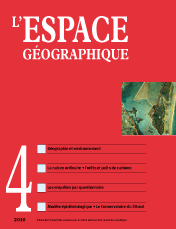

The “ordinary natural environment” in the Western world (2 fig., 1 photo)
In the context of the «sixth wave of extinction», scientists have mainly focused on rare and endangered natural elements. But presentday global changes require consideration not only of these elements but also of the natural environment as a whole. The ‘‘ordinary’’ natural environment, common and familiar, is also increasingly in need of conservation measures. Yet these new conservation issues lack definition and the new challenges have not been clearly synthesised. This paper proposes several definitions of the ‘‘ordinary’’ natural environment, focusing on its conservation and its study by geographers.
keywords: CONSERVATION, GEOGRAPHY, NATURE
Forests to save the planet: what potential for carbon storage? (5 fig., 2 tabl.)
Forests represent one of the most important focal points in the recent and ongoing negotiations on climate change. The process of reducing greenhouse gas emissions from deforestation and forest degradation at present under development, or the newly created Carbon Partnership fund for forestry (aiming in particular to promote afforestation of non-forested land) attest that forest areas are expected to provide real potential as carbon sinks. According to the FAO, the expansion of plantations could compensate «15 per cent of carbon emissions from fossil fuels over the next 50 years». This article aims to show the uncertainties and contradictions of a policy of this nature.
keywords: CARBON SINKS, EVALUATION, FOREST ECO-SYSTEM, GLOBAL WARMING
Surveys through questionnaires in environmental geography (2 fig.)
In France, surveys using questionnaires have been less widely developed than other survey techniques especially in environmental geography. We set out to account for the backwardness of this branch of geography and to explore the means to catch up. Thus, after presenting the uses and usefulness of this technique in geography, and in environmental geography in particular, we will examine the contribution of this technique and its difficulties, for instance in the area of the spatialization data. We will then suggest avenues of research to improve the construction of questionnaires addressing issues of wording and population sampling techniques or the use of a multi-source information system.
keywords: ENVIRONMENT, FRANCE, GEOGRAPHY, PERCEPTION, QUESTIONNAIRE
Dynamic modelling of plague in Madagascar: a bridge between theory and observation (7 fig.)
An important task in research on infectious diseases is to achieve a precise and localized assessment of the epidemiological risk in host and vector populations. To this end, the Individual-Based Modelling approach enables consideration of how spatial and individual heterogeneity affect endemic and epidemic dynamics at population level. Based on our modelling experience applied to bubonic plague in Madagascar, we demonstrate the potential of IBM to integrate various sources of knowledge. We also argue that it bridges the gap between traditional observational studies and theoretical models.
keywords: BUBONIC PLAGUE, DISEASE, EPIDEMIOLOGICAL RISK, INDIVIDUAL-BASED MODELLING, MADAGASCAR
Wetlands and conservation of the French coast: representations and frames of actions (3 photos)
The paper concern the status of wetlands in the Conservatoire de l’espace littoral, and the cognitive processes through which they are being acknowledged within an institution that is basically designed to preserve a natural and cultural terrestrial heritance. It shows how the Conservatoire de l’espace littoral, confronted with the evolution of environmental dynamics, has revised its doctrine and its strategy, based on issues of property and landscape rather than issues of coastal and marine ecosystems management. This shift from a heritage approach to an ecological approach, encompassing hybrid habitats related to both land and sea, has led the Conservatoire de l’espace littoral to alter its cognitive schemas, its values and its frames of action. These are the transforming processes that the author has set out to investigate in this paper.
keywords: COGNITIVE PROCESS, CONSERVING THE FRENCH COAST, ECOLOGICAL APPROACH, WETLAND
Book reviews
In this issue of l’Espace géographique, you will find critical reviews of the following books
REDON M. (2010). Des îles en partage. Haïti & République dominicaine, Saint-Martin, Timor. Toulouse: Éditions de l’université d’État de Haïti, Presses universitaires du Mirail, coll. « Villes et territoires », 326 p. (Philippe Pelletier, université de Lyon 2)
DEBOUDT P. (dir.) (2010). Inégalités écologiques, territoires littoraux et développement durable. Lille: Presses universitaires du Septentrion, 409 p. (Lydie Goeldner-Gianella, université Paris 1 Panthéon-Sorbonne)
DA Cunha A., Knoepfel P., Leresche J.-P., Nahrath S. (dir.)(2005). Enjeux du développement urbain durable. Lausanne: Presses polytechniques et universitaires romandes, 472 p. (Giovanni Fusco, université de Nice-Sophia Antipolis)
Farinelli F. (2009). De la raison cartographique. Paris: Éditions du Comité des travaux historiques et scientifiques, coll. « Orientations et méthodes », n° 13, 252 p. (Jean-Bernard Racine, université de Lausanne)
L’espace géographique 3/10![]()
![]() L’espace géographique 1/11
L’espace géographique 1/11
For subscribe or buy this issue: BELIN
![]() L’Espace géographique: contents
L’Espace géographique: contents
Last modified: April 2, 2013